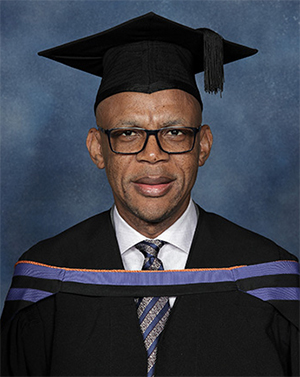

ANC spokesperson Pule Mabe
African National Congress (ANC) Spokesperson, Pule Mabe, was awarded a Master of Business Leadership (MBL) by Unisa’s School of Business Leadership (SBL) on 11 June 2019. The research report he submitted in completion of the qualification was also named the best among those submitted by his graduating class.
The research project focused on an innovative application of supply chain management concepts in a vertical integrated industry sector. Mabe’s report focused on practical solutions for South Africa and how state enterprises can overcome the challenges of service delivery by enhancing supply chain frameworks.
Said Prof Roy Ramphal, SBL Academic Director, in his congratulatory message: "In South Africa it seems to make a good sense that as the custodians of business education we focus less on prestige and more on innovation and working together with people who are key in driving economic development and provide solutions to country challenges. Mr Mabe’s work is a testament that the SBL is relevant and making a difference to citizens. We are a school of business leadership, and we associate with the needs of South Africa, both private and public sector."
According to Prof Raphael Mpofu, SBL Executive Dean, the business school continues to provide leadership development for business and public figures alike. "We all face the burning socio-economic crises in our country, crippling levels of unemployment, poor ethical leadership and the changing role played by political figures in economic development," he said. "We are conducting research on job creation and unemployment that can inform us, as a nation, how we can fine-tune our programmes such as the MBA and MBL to encourage innovative, solution-focused graduates."
Mabe is more than a politician and ANC spokesperson. He is an entrepreneur, inventor, game-changer, innovator and community builder. His courage and the thoroughness of his work are well known.
Born and bred in Namakgale Township near Phalaborwa in the Limpopo province, Mabe is a proud husband and father who is devoted to creating a comfortable home environment. His compassion and patience come in handy in parenting his two children.
Blessed with a great dose of passion and innovation, the world is in the palm of Mabe’s hand as he continues to investigate solutions in the field of portable waste management in the country.
Pule Mabe spoke to the news team about his MBL research journey and the award won by his report
How do you view the MBL research report award?
This is an important milestone, primarily because my research was based on an innovation I had developed and practically tested. This meant going beyond the normal trends to ascertain the rigour of the study and model as practically developed. I did not expect the award because my fellow MBL students have vast knowledge of different fields of specialty.
What influenced you to choose this field of study?
The field of portable waste management in our country has not been fully explored and examined. To address the growing concerns about the increasing deterioration and degradation of the human environment and natural resources, the World Commission on Environment and Development released a report, "Our Common Future", in 1987. This report underpinned sustainable development as the development that meets needs of the present without compromising the ability of the generations to meet their own need.
From the environmental point of view, there is a need to innovate prudent measures that are effective and comprehensive to preserve biodiversity and natural resources. In our increasingly resource-constrained world, the environmental sustainability rotates around the three Rs in the waste hierarchy: Reduce, Re-use and Recycle. Given the advances made in propelling forward the Fourth Industrial Revolution (4IR), it is necessary to check and establish compatibility of available portable waste management interventions in relation to our modern technological world.
What are your research highlights?
Here I have to mention three:
Why did you choose Unisa’s Graduate School of Business Leadership?
It is the best platform for business studies and related research. The Unisa SBL is regarded as one of the top business schools in South Africa, and it has a remarkable track record of awarding quality MBA/MBL degrees. I am a stickler for quality, and to be the best you need to study with and through the best.
Why is it important to innovate?
I am an ordinary South African who believes that each one of us has a contribution to make towards the betterment of our country, Africa and the world. With my own experience I realised that the genre of innovation demands a lot of patience, perseverance and dedication. As innovator you are a maverick who might not be easily understood. What is important is to never give up. I tell my kids all the time that doing good starts with a desire to be good, and that desire is driven by passion and determination.
How will this MBL add value to your work?
My MBL research encompasses all areas in which I operate; strategic leadership, governance, ethics and leadership development, to name but a few. This knowledge will be passed on to my fellow colleagues and cadres as we strive to collectively create a better South Africa for all.
What’s your advice to the Unisa SBL student community?
In my personal view, Unisa’s SBL is a perfect academic and leadership development platform for everyone willing to expand their knowledge base. It is incumbent upon all of us who had the opportunity to walk this path to use the acquired knowledge and expertise to make our communities even better. We have a role as academics to further balance our practical and theoretical spheres, and the SBL has the perfect platform to help individuals unearth that.
* Interview by Lesego Ravhudzulo, Journalist, Department of Institutional Advancement
Publish date: 2019-06-26 00:00:00.0